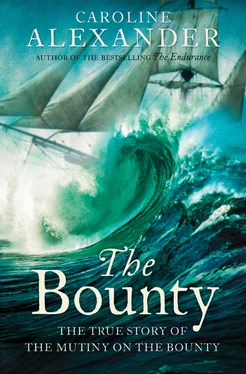Some years later, in personal correspondence, Bligh reported that ‘this List had Christian, Heywood and several other Names in it,’ and that he had approached his protégé ‘not conceiving Christian could be guilty of such a thing, and who, when I showed it to him, laughed as well as myself.’ To a man, the shore party professed their innocence to Bligh, and ‘denyd it so firmly, that He was inclined from Circumstances to believe them and said no more to them about it,’ according to Morrison. In the official log no mention is made of this mysterious list; Bligh’s personal log, in which he would have been most expected to have made some remarks about the event, ends on 23 October, and does not resume until 5 April 1789; a comprehensive index, in Bligh’s own handwriting, is all that can be found of the missing portion. The official log, submitted to the Admiralty, makes no mention of his suspicions whatsoever and shows Bligh’s professionalism at its best. If the men had convinced him of their innocence, then he was bound to ‘say no more about it.’ Or was the incident omitted for more self-serving reasons – because later events proved he had been duped? At least ‘three of the Party on shore’ would remain among the mutineers: Peter Heywood, William Brown and Fletcher Christian.
One curious and generally unremarked incident occurred four days after Churchill and his companions deserted. As Bligh reported, ‘one of my officers on shore’ cut a branch of an oil-nut tree growing at a marae , or sacred site, and, ‘accidently bringing it into the dwelling where my people are at, all the Natives both Men and Women suddenly left.’ The branch had tabooed the shore hut; no Tahitian would set foot here until the appropriate ceremony lifted the taboo. Curiously, however, as Bligh noted, ‘when I came on shore I found a branch of this Tree tyed to one of the Posts, altho they saw the effect it had of keeping the Natives from the House.’ Is it significant that in the immediate aftermath of the desertion one of the officers – Christian or Heywood – tabooed the house in which three men implicated on Churchill’s list happened to live? Was this a sign to Tahitian taios and allies to stay away, perhaps in the wake of an aborted plot? A whimsical amulet to ward off further trouble? Or, as Bligh clearly believed, mere happenstance?
Bligh seems to have accepted that the outcome to this adventure did not lie in his hands, and he returned his company to their former routine while awaiting whatever news his Tahitian friends brought him of the deserters. His own time was once again divided between the nursery and enquiry into local customs, and he observed with delight ‘the swarms of little Children which are in every part of the Country,’ flying kites, playing cat’s cradle, and skipping rope, the latter game, as he noted being ‘common with the Boys in England.’ While onshore on 16 January, he received a message from Fryer that a man known to have given conveyance to the deserters was on board the Bounty : did Bligh want Fryer to detain him? Incredulous, Bligh returned to the ship to find the informant had escaped by diving overboard and that no attempt had been made to follow him.
‘As he knew perfectly my determination in punishing this Man if ever he could be caught, it was an unnecessary delay in confining him,’ Bligh wrote of Fryer. The following day, he had even greater cause for anger. Spare sails that Bligh had ordered to be taken out of storage and aired were found to be mildewed and rotting.
‘If I had any Officers to supercede the Master and Boatswain, or was capable of doing without them, considering them as common Seamen, they should no longer occupy their respective Stations,’ Bligh fumed. ‘Scarce any neglect of duty can equal the criminality of this, for it appears that altho the Sails have been taken out twice since I have been in the Island, which I thought fully sufficient and I had trusted to their reports, Yet these New Sails never were brought out.’ Bligh had the sails washed in the sea, then hung to dry ‘to be ready for repairing’, a laborious task. The Bounty’s voyage was only half over; an estimated ten months of sailing lay ahead.
Almost three weeks passed before word was brought that the deserters had been located in Tettahah, some five miles distant. Bligh at once set out to apprehend them, although darkness was coming and it was a rainy, windy night. Surprised by Bligh where they had taken shelter, the three men resignedly surrendered without resistance. Once back at the ship, Bligh read the Articles of War and administered punishment: twelve lashes for Charles Churchill, two dozen each for William Muspratt and John Millward – to be repeated at a later date. In between the floggings, the men were confined in irons and found time to write Bligh an extraordinary letter:
Sir,
We should think ourselves wholly inexcusable if we omitted taking this earliest opportunity of returning our thanks for your goodness in delivering us from a trial by Court-Martial, the fatal consequences of which are obvious; and although we cannot possibly lay any claim to so great a favour, yet we humbly beg you will be pleased to remit any farther punishment; and we trust our future conduct will fully demonstrate our deep sense of your clemency, and our stedfast resolution to behave better hereafter.
We are,
Sir,
Your most obedient, most humble servants, C. Churchill, Wm. Muspratt, John Millward.
If the men believed that a submissive, honey-toned letter would charm their captain into dropping the second part of the punishment, they were proved mistaken when, eleven days later, the second round was indeed administered. Why Charles Churchill should have received a lesser punishment than his fellows is unclear. The punishment as a whole was, in any case, lenient; convicted deserters – with good service and character taken into consideration – could expect to receive 100 to 150 lashes. Bligh’s leniency had been carefully considered. As he wrote in his log, ‘this affair was solely caused by the neglect of the Officers who had the Watch.’ The officer in question, identified by Morrison as Midshipman Thomas Hayward, had been asleep at his station, a crime under the Articles of War no less serious than desertion. (‘No Person in or belonging to the Fleet shall sleep upon his Watch, or negligently perform the Duty imposed on him, or forsake his Station, upon Pain of Death…’) Bligh disrated the officer, turning him before the mast. According to an approving Morrison, he had also been clapped in irons until the runaways were returned.
‘I was induced to give them all a lecture on this occasion,’ Bligh continued, referring to his other officers, ‘and endeavored to show them that however exempt they were at present from the like punishment, yet they were equally subject by the Articles of War to a condign one.’ In other words, although his officers were exempt ‘at present’ from being flogged, they were liable to ‘a severe and well-deserved’ punishment. It is within this remarkable lecture that the tensions so fatal to the voyage can be discerned most transparently.
‘An Officer with Men under his care is at all times in some degree responsible for their conduct,’ Bligh wrote in his log, paraphrasing his lecture, ‘but when from his neglect Men are brought to punishment while he only meets with a reprimand, because a publick conviction by Tryal will bring both into a more severe and dangerous situation, an alternative often laid aside through lenity, and sometimes necessity, as it now is in both cases; it is an unpleasant thing to remark that no feelings of honor, or sense of shame is to be Observed in such an Offender.’
The list of his officers’ transgressions while in Tahiti, quite apart from incidents in the earlier part of the voyage, is impressive: when moving from Matavai to Oparre, Fryer had allowed the ship to run aground; a midshipman had slept on his watch and allowed three men to desert; the sails had been allowed to rot; on returning from capturing the deserters, Bligh had discovered that the ship’s timekeeper, critical to accurate navigation, had been allowed to run down; the ship’s rudder had been stolen from the camp; and in early March, an azimuth compass had been taken from under the noses of the men onshore, for which, according to Morrison, ‘Mr. Bligh…went on shore and rebuked the Officers at the tent for neglecting their duty.’ In addition, there are two enigmatic entries in the index Bligh composed to his missing personal log that refer to ‘Mr. Hallet’s contumacy’ and ‘Mr. Hallet’s behaviour.’
Читать дальше












